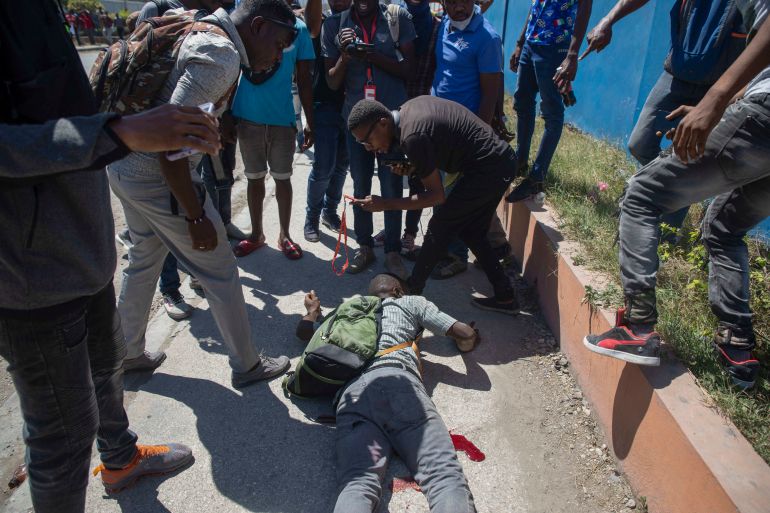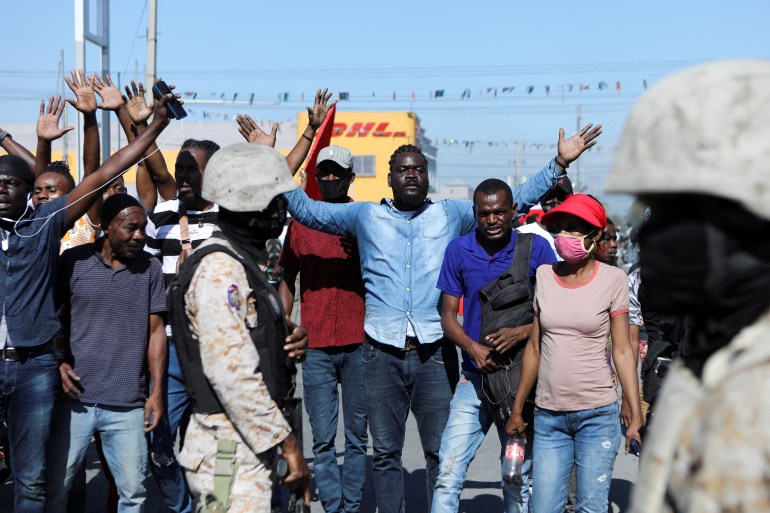Police fire at factory protesters in Haiti, wounding three: AP
Associated Press says shooting in Port-au-Prince took place as new three-day strike organised by factory workers began.

Men wearing police uniforms fired into a group of people at a protest in the Haitian capital, after thousands of Haitian factory workers launched a new strike to demand higher wages than those the prime minister announced earlier this week.
The Associated Press reported that it saw the men on Wednesday firing from inside a car with police license plates, wounding at least three people, including two journalists covering the event.
Keep reading
list of 3 itemsTwo reported dead as earthquakes rattle southern Haiti
At least three dead in Haiti rains, flooding: Official
A police spokesperson could not be immediately reached for comment by AP and the condition of the wounded people was not immediately clear.
Earlier, police had fired tear gas as protesters threw rocks at them and used trucks to block a main road near the international airport in Port-au-Prince.
It was the first day of a three-day strike organised by factory workers who also shut down an industrial park earlier this month to protest their pay, which then was about 500 gourdes ($4.80) for nine hours of work a day.

The developments come amid worsening economic and political conditions in Haiti in the aftermath of the assassination of President Jovenel Moise in July last year. The situation has the potential to grow worse amid a political deadlock as interim Prime Minister Ariel Henry’s term in office ended on February 7, setting off a legitimacy crisis and compounding the nation’s economic troubles.
Henry has insisted on remaining in office until elections can be held. No date has yet been set.
Haiti is currently reeling from a host of other crises. In 2010, the Caribbean island was rocked by a magnitude 7.2 earthquake that killed an estimated 360,000 people and devastated much of the island. Amid persistent insecurity and gang violence, Haiti has struggled to recover and rebuild.
Then, in August, the island was struck by another earthquake, killing more than 300 people and devastating much of the southern parts of the country.
On Sunday, Henry announced minimum wage hikes in an attempt to quell the protests.
But the increase of 185 gourdes ($1.80) a day for factory workers only served to enrage them. “Can you imagine? I have two kids, and I have to pay for a home,” said 38-year-old Andre Saintil. “The government is keeping us in misery.”
“People can’t do anything with this miserable salary,” said Jean Wilkens Pierre.

The 39-year-old factory worker said the salary barely covers food and transportation costs at a time when Haiti is seeing double-digit inflation. He said he would accept nothing less than a minimum daily wage of 1,500 gourdes ($14).
He was part of a crowd that carried tree branches and chanted, “You raised the gas, but didn’t raise our salaries”, referring to the prime minister’s recent announcement that the government could no longer afford to keep fuel subsidies in place.
“They probably think we can’t resist, that we’ll get tired of protesting, but this is going to be an ongoing fight … for them to understand we are human beings,” Saintil said.
Henry announced other salary increases including a new daily wage of 540 gourdes ($5) for those working in restaurants and agriculture and 770 gourdes (more than $7) for those employed in places including supermarkets, car dealerships and undertakers.